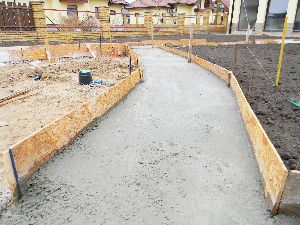
Concrete is popular among homeowners for driveway and walkway paving due to its load-bearing capacity and long life cycle. How the site is prepared, the ratio of ingredients in the mixture, and steps taken during the curing process affect whether the surface will crack. Use the following advice to prevent fissures from forming after the installation.
How to Prevent Cracks in Newly Poured Concrete
1. Grade the Ground
Grade the land before installation so that the paving material has a supportive base on which to dry. The level ground should compacted with a hand tool or the back of a shovel. When the surface is free of low spots and raised areas, the concrete won't be put under extreme tension as it settles and is less likely to crack.
2. Avoid Excess Water in the Mixture

The concrete mix should include 15 to 20% water, 60 to 75% aggregate, and 10 to 15% cement. Avoid adding more water than recommended, as the moisture will cause the solution to shrink more as it dries.
Shrinkage increases the likelihood of cracks. The right ratio of materials ensures the strength and durability of the pavement.
3. Cure the Concrete
Temperatures can affect how fast moisture evaporates from the mixture as it sets. For example, the top layer will dry faster than those underneath when exposed to direct sunlight.
The uneven drying can cause mapping cracks. During the first week after installation, spray the pavement with water a few times a day to reduce the evaporation speed of the moisture and prevent cracks.
For high-quality concrete to complete your driveway or walkway installation, contact Politte Ready Mix LLC in Potosi, MO. The company has been a leading supplier of sand and ready-mixed concrete products for residents in Washington, St. Francis, and Iron counties since 1973. Learn more about their services online, or call (573) 438-5417 to request a quote for concrete delivery.
About the Business
Have a question? Ask the experts!
Send your question

